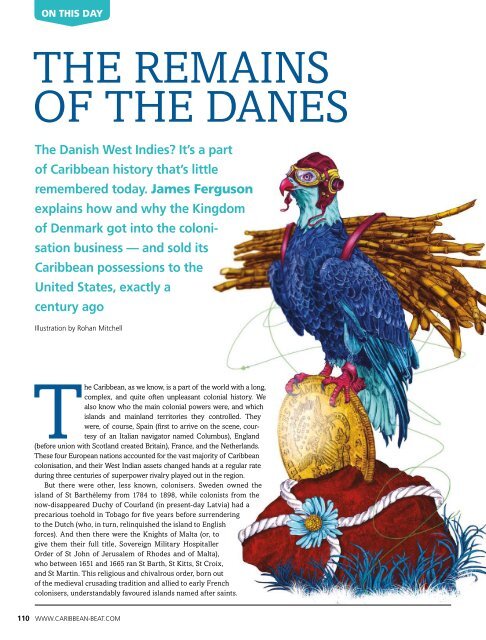Caribbean Beat — January/February 2017 (#143)
A calendar of events; music, film, and book reviews; travel features; people profiles, and much more.
A calendar of events; music, film, and book reviews; travel features; people profiles, and much more.
You also want an ePaper? Increase the reach of your titles
YUMPU automatically turns print PDFs into web optimized ePapers that Google loves.
on this day<br />
The remains<br />
of the Danes<br />
The Danish West Indies? It’s a part<br />
of <strong>Caribbean</strong> history that’s little<br />
remembered today. James Ferguson<br />
explains how and why the Kingdom<br />
of Denmark got into the colonisation<br />
business <strong>—</strong> and sold its<br />
<strong>Caribbean</strong> possessions to the<br />
United States, exactly a<br />
century ago<br />
Illustration by Rohan Mitchell<br />
The <strong>Caribbean</strong>, as we know, is a part of the world with a long,<br />
complex, and quite often unpleasant colonial history. We<br />
also know who the main colonial powers were, and which<br />
islands and mainland territories they controlled. They<br />
were, of course, Spain (first to arrive on the scene, courtesy<br />
of an Italian navigator named Columbus), England<br />
(before union with Scotland created Britain), France, and the Netherlands.<br />
These four European nations accounted for the vast majority of <strong>Caribbean</strong><br />
colonisation, and their West Indian assets changed hands at a regular rate<br />
during three centuries of superpower rivalry played out in the region.<br />
But there were other, less known, colonisers. Sweden owned the<br />
island of St Barthélemy from 1784 to 1898, while colonists from the<br />
now-disappeared Duchy of Courland (in present-day Latvia) had a<br />
precarious toehold in Tobago for five years before surrendering<br />
to the Dutch (who, in turn, relinquished the island to English<br />
forces). And then there were the Knights of Malta (or, to<br />
give them their full title, Sovereign Military Hospitaller<br />
Order of St John of Jerusalem of Rhodes and of Malta),<br />
who between 1651 and 1665 ran St Barth, St Kitts, St Croix,<br />
and St Martin. This religious and chivalrous order, born out<br />
of the medieval crusading tradition and allied to early French<br />
colonisers, understandably favoured islands named after saints.<br />
110 WWW.CARIBBEAN-BEAT.COM


















